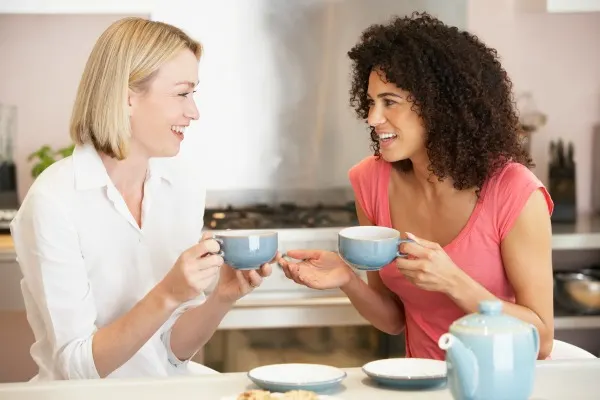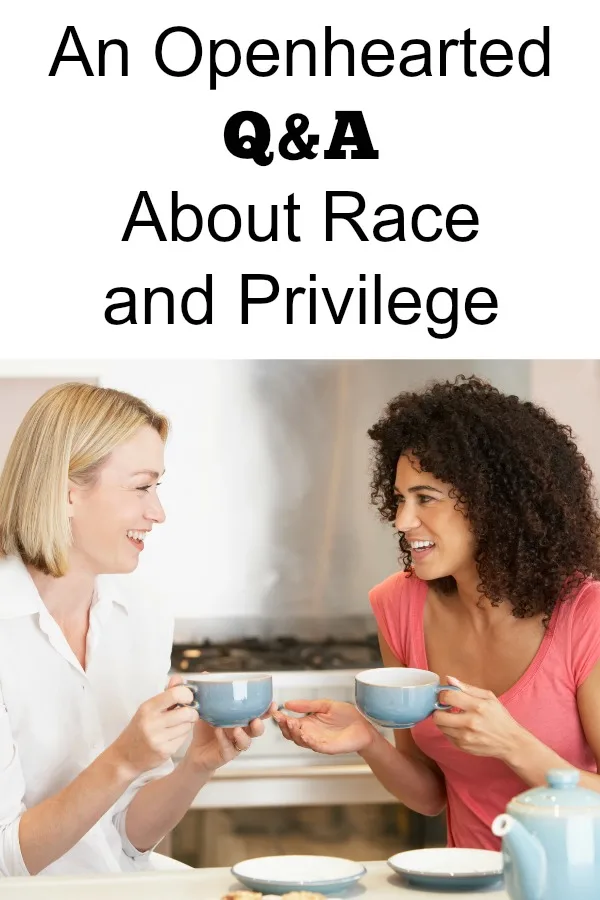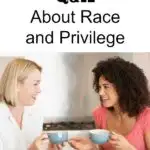Note from Darcy: Before you being reading this openhearted discussion about race and privilege, I want to say thank you again to my friend René Brooks of Black Girl Lost Keys for collaborating on this post with me. There is a lot here, but I urge you to take your time and read through it.
I ran late on writing this along with Darcy. I let these questions sit and marinate in my mind, and lay on my heart. These questions are difficult, because the answers are so often simple in theory, yet hard in practice. Years of social conditioning have made it so difficult to show people the right way to treat people of color, and people of other marginalized groups. It is no small feat to have these discussions as we live in a country that so quickly jumps to its own defense in the matter of race. What it is going to take to heal this deep wound of oppression and discrimination is honesty. Brutal, in your face, uncomfortable honesty.
We often steer away from discussions about race because they aren’t polite. These aren’t light frothy conversations for your ladies luncheon, or your wing night with the boys. These discussions touch a root of pain within many people of color that those who do not share the experience cannot even begin to understand. Our politeness is killing us.

An Openhearted Q&A About Race and Privilege
I urge you, as Darcy has done, to begin questioning these topics. Talk to your friends about them, talk to your children about them. Most of all, listen. Listen especially when you feel offended by something that the marginalized person is saying. The immediate response to privilege being challenged is often offense. You are bigger than that, you need only open your mind and challenge your thinking to learn something new. Without further ado, here is our discussion on race and privilege. I hope these spark discussions in your home and community that lead to a greater understanding of what it means to be an ally, and a good neighbor.
When do families of color begin talking to their kids about racism?
I can remember beginning those talks in elementary school. A lot of people may feel like children who are that age are too young to discuss such things, but the scenarios can and do present themselves. As parents, it is our responsibility to guide our children and prepare them for what life will throw at them. Unfortunately, a black child in America is going to face discrimination. Rather than becoming squeamish over that reality, we tell them what to do.
Are white families waiting too long to start these discussions with our kids?
Yes. There’s no more gentle way to put it, but they are, and that is a privilege that children of color have never been afforded. That innocence about this evil of racism is something that our children will never know, because if we try to shield them from it we will run the risk of them learning the lesson from the world, which will be much less gentle. This is a distinction that has always felt particularly unfair to me. If all children don’t receive that luxury, I don’t think anyone’s should. However, I also believe that ALL children knowing what to expect means that you’re raising little allies who know from the start that racism exists, it is wrong, and they have an obligation to speak out and help their friends when they see it.
What do you think is the most important thing white parents should be teaching their kids about racism?
I think we should explain to white children that racism is not just “meanness” or an unfortunate sadness that other people go through. White children grow up seeing being racist almost in the same way that being ill mannered would be seen. I think it is critical to impress upon them that racism is dangerous, it hurts the people who they love, and can also hurt them. Again, when you’re raising an ally, you have got to raise them young if it is possible. Set a good example for them, don’t allow racist family members or friends ( if you have them) to get away with saying racist things around you or your children. You are under no obligation to observe conventional etiquette when people’s lives are on the line.
How do you talk about privilege?
I think children have an easier time understanding these concepts than we do. They have no preconceived notions of race and what it means. With a young child, I would explain to them that some people in life have to live life differently because some people think they are bad people. Because we don’t look like them, people treat us more nicely than they treat this other family. This is called privilege, and it is important for us to understand and listen to the people who are not privileged as we are. Before we judge them or look down on them in any way we have to understand that we have an advantage in life that they will never have, and it isn’t their fault.
When I teach my kids about safety, they learn they can go to the police for help. How does that conversation differ? Who can you trust with your family’s safety?
You know, nobody has ever asked me this question before. I have no recollection of ever being told as a child to call the police. Definitely not by other black people. It is difficult to tell your children to seek help from the person who beat up one of your friends our relatives. If anything, we try to resolve things between us as much as possible so we do not have to involve the police, because we do not trust them to give us a fair chance. Who do we trust with our family’s safety? This is the true challenge of being black in America, and a question we often ask ourselves. We can only rely on each other, and the few people we allow into our circles to help attempt to keep us safe. Still, many of us wake up with the knowledge that we could fall victim to a state sanctioned murder.
Do you have any tips on how to expand the diversity of our friends? Especially as an introvert who lives in a predominantly white suburb? I want my children to spend time with more diverse people, but struggle with how to do this without it seeming like we’re searching for a token family for playdates.
Great question – I would say to look around the area’s YMCA or YWCA or other public places where you can see people of color hanging out. Make friends if you like them. Everyone could use more diversity. But if the person isn’t someone you feel a connection with, don’t feel obligated just because they fit into your diversity profile. I know that seems like it should go without saying, but sadly . . . it doesn’t.
My daughter said she knows we’re trying to stop it, but asked me when will white people not liking brown people end? I feel like it’s a valid question – when will it end? I said part of working to end it is having discussions about racism and calling people out when they are doing/saying racist things. What else can we do in the everyday to make a difference?
I hear her, I’ve been wondering the answer to that one myself. It will end when people are ready to make it stop. Unfortunately, until they are ready to acknowledge that there is no superiority and that white people are going to have to do their part in evening the playing field, it isn’t going to happen. I see many people taking a “not my problem” approach to it. You hear this commonly with the people who state “ I never owned slaves” or “they were never working a field, what’s their problem?” folks. The problem we have here is systemic, spanning centuries in this country. Unfortunately, this is a huge wrong that many people still are not prepared to face, and are not willing to face even the slightest of discomfort to correct.
What terms / identifiers should we be teaching our children to use? I think a common fear is using the “wrong” words: POC, Black, African American
I myself prefer black. I’m not offended by the other terms, it’s just the one that feels most comfortable to me. I think instead of making it an uncomfortable situation, you could ask someone what they prefer. “In conversations where race is relevant, what do you prefer me to call you?” seems like an easy enough way to start the conversation. Even admitting that you feel like a fish out of water is ok. Most people aren’t losing sleep over whether you’re calling them POC, Black, or African-American as long as you’re not calling them the N-word.
If kids are born without racial bias, how do we continue to encourage acceptance? (It’s easy to think “we don’t teach hate in our family” but I’m not sure that is doing enough. Too similar to thinking they are colorblind)
Teach them the differences. The differences are what make us unique. Teach them to admire culture and not mock it. Teach them humility so they can learn new things without feeling entitled to information from POC. Show them to learn by observation, this is how most of us gain our understanding of white culture.
How do we teach kids about latent racism? Micro aggressions?
This is where you unfortunately have a lot of resources to show them racism/prejudice/homophobia in action. The daily news, the internet, and real life experiences are the best ways to teach people. Take screenshots of interactions, show them the difference in reporting on crimes committed by people of color versus white people. There are context clues to look for that children will see immediately.
How do we keep the conversation going? Books, documentaries, museums, cultural events?
Race is an issue throughout this country. There are limitless opportunities for you to show them something new. There are fantastic children’s books out there, like “Amazing Grace”. There is another book about a young black girl called “I love my hair,” that shows children how to appreciate their unique beauty.
Do white kids need more diversity in their books, media, and toys/dolls?
Absolutely they do. Learning is all about exposure. It is easy to believe that just because one culture controls the majority of the media and the products we use, that they are “normal.” There is no such thing as normal here. Children love to share new experiences, try new foods, meet new friends. Take advantage of their curiosity and show them how to channel that respectfully into learning. Every chance you can get, show them something new.
How do we discuss that sometimes people we believe are good people are racist / do bad things? (ex: cops, family members)
One of the best things we can do for children is to show them that racism is a spectrum. Good people think and say bad things. People often reject the notion that they can do or say something racist because they are a nice person. All it requires to be racist is to think a racist thought, to group people together by their race. To think that your way of doing things is normal or superior to others is racist. It really is that simple.
How do we start the conversation with our kids? (other than sitting down and saying, today we’re going to talk about racism and what that is… or IS that the best direct approach?)
I think sitting them down and explaining it to them, and then following up with your own good example is the best. Let them see how bad these things really are. Let them know that people die because of racism. Allow your children to see you become angry at these injustices.
How can white families best support non-white families in our communities?
Watch their children closely around other families. The majority of adults would never think to confront another adult directly, but this courtesy isn’t extended to children. Children are often exposed when their parents are not nearby. Do not allow anyone to assume that laughing children are up to no good. Do not allow anyone to criticize the way a child is doing things. You defending them could color their entire worldview. If you see someone being overly critical or disciplinary towards children, speak up. Tell the child’s parents, notify the school board, say something and put a stop to it. People are often reluctant to like children be children, and deny them their innocence.
How do we learn to be better allies? How do we teach our kids to be an ally?
The process for becoming a better ally is like the process for learning to be a better person. Listen, be respectful. Stay humble. Know when to speak, and when to be quiet. Always, ALWAYS stay open minded. Each of us stands at various intersection of privilege, and we would do well to remember that. Though I live my life as a black woman, I still have privilege as a straight woman. I have privilege as someone without a physical disability. We all make missteps, and we should apologize, learn, and do better.
How do we talk to our white friends about what is going on when we’re all afraid of being labeled a racist? (with good intentions, but may trip over words – not referring to someone who is blatantly hateful)
I’ve always been curious about why it is more important to be perceived as non-racist than it is to actually BE non-racist. It seems to me, from the outside looking in, that the concern is always more about how things look than how they actually are. The best way to talk over things is to just talk them over. Especially when you are all learning. There is a wealth of information on Google.
What does it truly mean to acknowledge our privilege?
Have humility about the advantages you have, and use your voice to lift up others. There is no need to be ashamed of your privilege, use it as a safe haven. That’s the best thing you can do for your fellow man.
If we discover we’ve been guilty of latent racism/microaggressions – how do we move beyond that? That this is a bigger issue than us and our personal feelings and it doesn’t mean we’re a bad person and will always be a “bad” person.
Expect people to be angry. They have that right. Take what you have learned from the experience, use it to educate other people, and move forward. If you were misjudged, understand that nobody is perfect, and try not to take it personally. We all are doing the best we can.
How do we show our children that we are learning along with them and striving to do better?
Example, example, example. There is nothing better you can do than showing your children the way to be by being that way. I can’t stress this enough.
Are there common sayings, jokes, activities, questions that are perpetuating racism or insensitive that we may not realize due to our privilege?
There are too many to name, and unfortunately even I don’t know them all. This is where it is really important to keep your ears, heart and mind open. If someone says that something you said is offensive, it simply is. Nobody has the right to tell someone else their feelings are wrong, even if that wasn’t your intent. Listen and learn from each other.
Darcy, this was a serious list, and I am honored that you gave me the opportunity to expound on many of these topics. It seems complicated, but it isn’t as bad as it seems. We have to listen to and respect one another in order to get through. I appreciate you taking that step along with me.

Who am I? Well, for starters, my name is René. Ever since I can remember, I have been a typical ADHDer. I lose my keys, my books, my essays, my homework, and my glasses when they are on my face. I was diagnosed at the tender age of 11, but never received treatment until age 25. The experience of learning that what I have is real and that it can be worked with began there.
Black Girl Lost Keys was created to share the experience of receiving a diagnosis of ADHD late in life, all while being part of a demographic that is still largely skeptical of mental illnesses.

